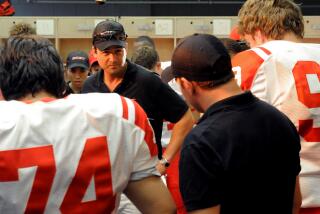Dissecting a tragedy that transformed a town
- Share via
It doesn’t really matter how much you already know about the tragedy that befell Marshall University in the fall of 1970. The first 20 minutes of “We Are Marshall” -- a drama based on the plane crash that took the lives of 75 football players, coaches and boosters, and its aftermath -- will grab you by the face mask and make you take notice. Equally compelling and disturbing, the sequence so effectively makes the catastrophe visceral, you wish the filmmakers had been better able to escape some of the more predictable trappings of the inspirational sports melodrama later on.
Director McG, in a surprising departure from “Charlie’s Angels” and “Charlie’s Angels: Full Throttle,” contrasts highly stylized football action and the emotionally charged plane crash with an unobtrusive approach to the dramatic scenes that favorably spotlights the actors and Jamie Linden’s earnest, ardent screenplay. It’s a tactic that provides the film with a particularly attuned sense of pacing and keeps the sentiment in check.
Linden and co-story writer Cory Helms chose to filter the tale through six characters who represent the various attitudes and aspects of the Marshall community:
* Guilt-ridden assistant coach Red Dawson (Matthew Fox), who wasn’t aboard the fateful flight because he volunteers at the last minute to take the place of another coach on a recruiting trip and is reluctant to return to coaching.
* Defensive back Nate Ruffin (Anthony Mackie), one of four players left to play the following season, who missed the trip due to an injury.
* Paul Griffen (Ian McShane), the head of the school board whose grief over losing his son is so great, he can’t move forward.
* University president Don Dedmon (David Strathairn), who generally doesn’t know whether the team won or lost, let alone the difference between a power-I formation or the veer, but finds himself facing difficult decisions about how to proceed after the crash.
* Jack Lengyel (Matthew McConaughey), the eccentric outsider ultimately hired to resurrect the football program as the new head coach.
* Cheerleader Annie Cantrell (Kate Mara -- the offspring of two venerable NFL families, the Maras and the Rooneys), a composite of various women who loses her fiancee and narrates the opening and closing scenes of the film.
Set in Huntington, W.Va., a steel town on the Ohio River that -- like Odessa, Texas, in “Friday Night Lights” -- is a town whose identity is inexorably linked with its football team. The loss of the team leaves a gaping hole at the center of Marshall and Huntington, and the film’s main dramatic question is what to do about it.
After the difficult decision to resume play in 1971 is made, it remains to be seen if that is the proper way to honor the dead. Lengyel arrives from a small college in Ohio, a cockeyed philosopher whose long-way-around-the-barn reasoning slowly wins people over, but his enthusiasm is offset by the rest of Huntington’s pain. The Thundering Herd’s return -- made possible by an NCAA ruling that let freshmen play -- is both a salve and painful reminder of what has happened.
McConaughey’s performance is oddly comic but actually serves to counter more traditional interpretations of a stoic coach leading his charges. There’s a compassion to the scenes with Fox, and especially a climactic scene with Mackie, that erases any question of whether Lengyel is on the level. The film is injected with a refreshing energy whenever McConaughey is on-screen, balancing some of the inherent sadness of the story.
Where the film falters is its adherence to cliches of the genre. Sports movies, especially those based on “true stories,” too easily fall into a structure built around “the big game.” The characters, whether based on real people or composites, tend to flatten out, lacking the depth and flaws that a dramatist might add. This one is no different as football and a debate over the importance of winning gradually overwhelms the emotional elements.
It eventually boils down to the old maxim “Winning isn’t everything, it’s the only thing” versus “It’s not whether you win or lose, but how you play the game.” At the time of the crash, Marshall was by no means a football powerhouse and no one expected the reformed team to do much winning. To the film’s credit it argues that winning today or tomorrow may not be the point, but creating the opportunity for future wins, and a sense of hope, is what matters most.
*
“We Are Marshall.” MPAA rating: PG for emotional thematic material, a crash scene and mild language. Running time: 2 hours, 7 minutes. In general release.
More to Read
Only good movies
Get the Indie Focus newsletter, Mark Olsen's weekly guide to the world of cinema.
You may occasionally receive promotional content from the Los Angeles Times.











